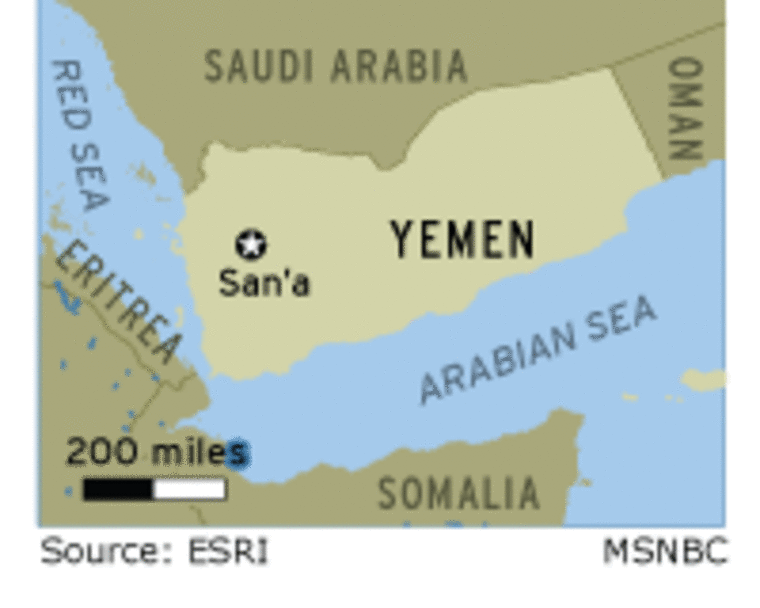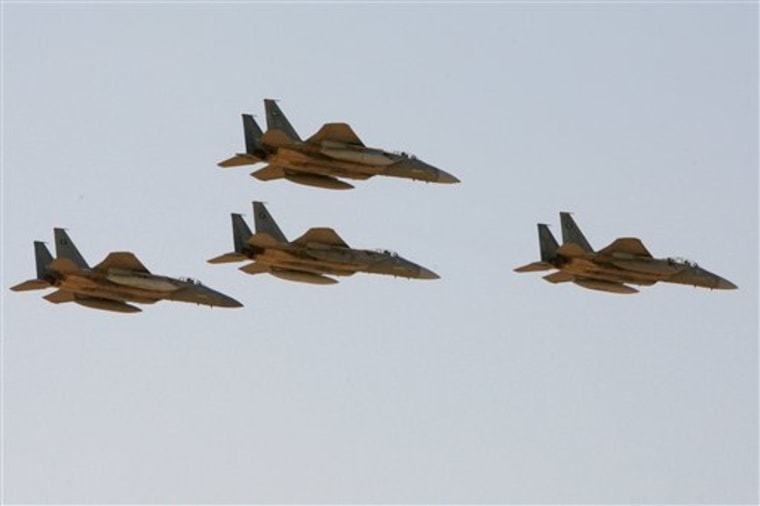Saudi Arabia sent fighter jets and artillery bombardments across the border into northern Yemen on Thursday in a military incursion apparently aimed at helping its troubled southern neighbor control an escalating Shiite rebellion.
The Saudis — owners of a sophisticated air force they rarely use — have been increasingly worried that extremism and instability in Yemen could spill over to their country, the world's largest oil exporter. The offensive came two days after the killing of a Saudi soldier, blamed on the rebels.
Yemen denied any military action by Saudi Arabia inside its borders. But Yemen's president is a key ally of the Saudis, making it highly unlikely the kingdom would have launched the offensive without tacit Yemeni agreement.
The offensive immediately raised concerns of another proxy war in the Middle East between Iran and Saudi Arabia, a key U.S. ally. Shiite Iran is believed to favor the rebels in Yemen while Saudi Arabia, which is Sunni, is Iran's fiercest regional rival.
The same dynamic has played out in various forms in Lebanon, where Iran supports the Shiite militant Hezbollah and Saudi Arabia favors a U.S.-backed faction, and in Iraq, where Saudi Arabia and Iran have thrown support to conflicting sides in the Sunni-Shiite struggle.
'Sustained operation'
A top Saudi government adviser confirmed "a large scale" military operation underway on the Saudi-Yemeni border with further reinforcements sent to the rugged, mountainous area.
"It is a sustained operation which aims to finish this problem on our border," he said, speaking on condition of anonymity because of the sensitivity of the issue. He said Saudi troops were coordinating with Yemen's army, but Yemen's defense ministry denied the Saudis were inside the country.
The northern rebels, known as Hawthis, have been battling Yemeni government forces the past few months in the latest flare-up of a sporadic five-year conflict. They claim their needs are ignored by a Yemeni government that is increasingly allied with hard-line Sunni fundamentalists, who consider Shiites heretics.
The rebels said the Saudi airstrikes hit five areas in their northern stronghold Thursday but it was not possible to independently verify the reports. They said there were dead and wounded, and that homes were destroyed.
"Saudi jets dropped bombs on a crowded areas including a local market in the northern province of Saada," Hawthi spokesman Mohammed Abdel-Salam told The Associated Press. "They claim they are targeting al-Hawthis, but regrettably they are killing civilians like the government does."
He said the attacks were followed by hundreds of shells from the border, but there was no reliable information about casualties.
Assault on northern rebels
The fighting is more than 600 miles from Saudi Arabia's oil fields on the kingdom's eastern Persian Gulf coast. But northern Yemen overlooks the Red Sea, the world's busiest route for oil tankers.
Two Arab diplomats, speaking on condition of anonymity, said Saudi Tornado and F-15 warplanes had been bombarding targets inside Yemen since Wednesday afternoon, inflicting significant casualties on rebels. The diplomats spoke on condition of anonymity because they are not allowed to talk to the media.
They said army units and special forces also had been sent to northern Yemen, and that several Saudi towns on the border had been evacuated as a precaution.

The weak central government of Yemen, which has little control outside the capital San'a, is fighting on multiple fronts including the northern rebels and a separatist movement in the south. But the most worrisome is a lingering threat from al-Qaida militants.
The U.S. also fears any Yemeni fighting could spill over into Saudi Arabia and is concerned that Yemen could become a haven for al-Qaida militants hiding out in the nation, at the tip of the Arabian peninsula.
The Yemeni government openly accuses Iran of arming the Hawthis rebels, but there has been no public evidence to back those claims, said Joost Hiltermann, deputy program director of the Middle East program for the International Crisis Group think tank in London.
"I think Iran is probably pleased with what is happening, but that is not the same as saying they are supporting the Hawthis," Hiltermann said.
Yemeni conflicts
Simon Henderson, director of Gulf and energy policy at the Washington Institute for Near East Policy in Washington, agreed that there is no clear evidence that Iran funds the rebels. But he said there is a wide assumption that Iran favors the Hawthis and the Saudis are backing Yemen's Sunni president.
"So it is a Saudi-Iranian proxy war," he said.
Saudi Arabia, rich in oil, has one of the world's most sophisticated air forces but rarely uses it.
The bulk of its air power, with more than 350 combat aircraft, derives from squadrons of F-15s and British-supplied Tornados, according to the military and intelligence analysis group GlobalSecurity.org. The kingdom also for decades has received U.S. military assistance in the form of training.
The Saudi incursion marks the first time since the 1991 Gulf War that the country has deployed military might beyond its borders.
In that war, Saudi forces assisted the U.S. Marine Corps, providing staging grounds for airstrikes and in joint operations targeting Iraqi positions in Kuwait with artillery fire and ground offensives.
The incursion is not, however, Saudi Arabia's first involvement in internal Yemeni conflicts. During Yemen's 1962-70 civil war, sparked by a military coup that overthrew Yemen's royalist government, Saudi Arabia supported the royalists against the Egyptian-backed government.
When civil war erupted again in 1994, it was widely believed that the Saudis sided with southern secessionist rebels against the central government.
A security official told Saudi Arabia's state news agency that the soldier died when gunmen infiltrated from Yemen and attacked security guards patrolling the Mount Dokhan border area Tuesday. Rebels said that area was among the bombing targets Thursday.
The Gulf Cooperation Council, the region's main diplomatic forum, condemned what it called the "violation and infiltration" of Saudi Arabia's borders. "Saudi Arabia is capable of protecting its lands," it warned in a statement.
More on: Yemen | Saudi Arabia | Iran
